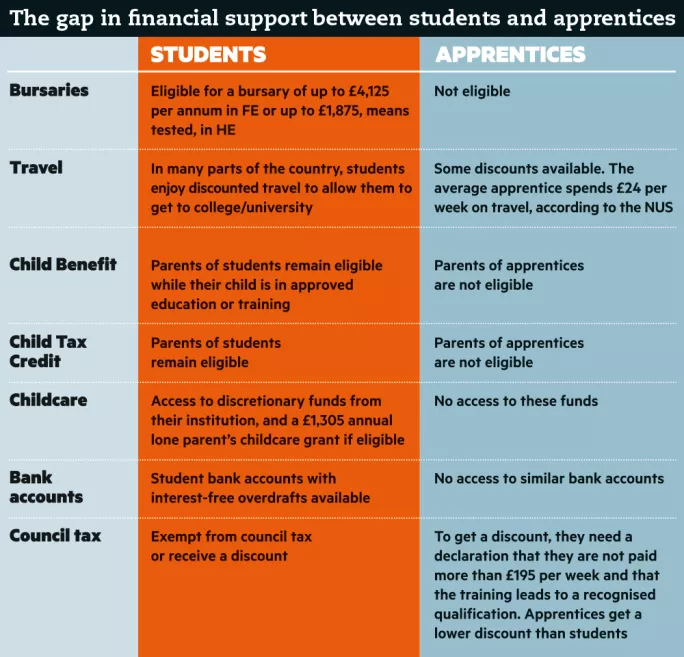Apprentices ‘suffer low pay without financial support’

Apprentices are facing the “double blow” of low pay and no access to financial support that students at colleges and university can receive, the NUS students’ union has warned.
The union said the low apprentice minimum wage, coupled with a significant pay gap between male and female apprentices, means that apprenticeships could be a less attractive option than other education pathways - despite the government’s aim to grow the scheme to tackle youth unemployment and the skills gap.
Unlike full-time students, apprentices are not exempt from council tax - although some can receive a discount - and have no access to student travel concessions, student bank accounts or student bursaries.
Updated findings by the NUS also show that, because apprenticeships are often not recognised as learning by the Department for Work and Pensions, apprentices’ families could lose out on child benefits and other support.
‘Inequality’ in system
NUS Scotland vice-president Rob Henthorn said apprenticeships and vocational education represented a “fantastic pathway” into education and training, and provided a valuable alternative to college or university. “However, we continue to see inequalities both within apprenticeships and with other education routes,” he added.
Mr Henthorn said a young person going into an apprenticeship could face a significant financial disadvantage compared with other learners and those on the national minimum wage. They could also face a “double blow of not receiving any of the benefits, like discounted travel or council tax exemption that full-time students can receive”.
“This is a huge barrier to someone considering their options, particularly those with no additional income, those living away from home, and anyone with other responsibilities,” he said.
We continue to see inequalities both within apprenticeships and with other education routes
Apprentices who are either aged under 19 or are in the first year of their apprenticeship are subject to the apprentice minimum wage - which currently stands at £3.40 and will rise to £3.50 in April. That compares with a minimum wage of £4 for under-18s and £5.55 for 18- to 20-year-olds.
The NUS had previously warned that female apprentices earned significantly less than men - largely due to an under-representation of women in higher paid apprenticeship schemes like engineering.
Mr Henthorn said: “It’s simply unacceptable that women apprentices in Scotland are earning significantly less than men, which runs the very real risk of women seeing apprenticeships as a less viable option than other education pathways whose support systems don’t have a gender gap.”

A spokesman for Skills Development Scotland, the body in charge of the Modern Apprenticeship scheme in Scotland, said the minimum wage for apprentices was set by HMRC, but many employers paid above this level.
He said apprenticeships were jobs that provided the opportunity for people to work, learn and earn, gaining industry recognised training and qualifications.
Four out of five former apprentices said their apprenticeship had led to either working at a higher level, working for higher pay, doing a job with more responsibilities or all three, he added.
A spokesman for the Scottish government said it was committed to supporting young people into Modern Apprenticeships “as an excellent start to a career”.
Modern Apprentices, unlike college and university students, are in paid employment, he said, adding that over the past four years there had been more than 100,000 new Modern Apprenticeships and this was set to increase to 30,000 starters each year by 2020.
He added: “In order to ensure the longer-term sustainability of our national concessionary travel scheme, and to extend free bus travel to young modern apprentices, we are preparing to engage with stakeholders to gather views.”
You need a Tes subscription to read this article
Subscribe now to read this article and get other subscriber-only content:
- Unlimited access to all Tes magazine content
- Exclusive subscriber-only stories
- Award-winning email newsletters
Already a subscriber? Log in
You need a subscription to read this article
Subscribe now to read this article and get other subscriber-only content, including:
- Unlimited access to all Tes magazine content
- Exclusive subscriber-only stories
- Award-winning email newsletters